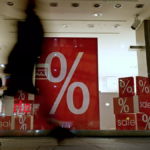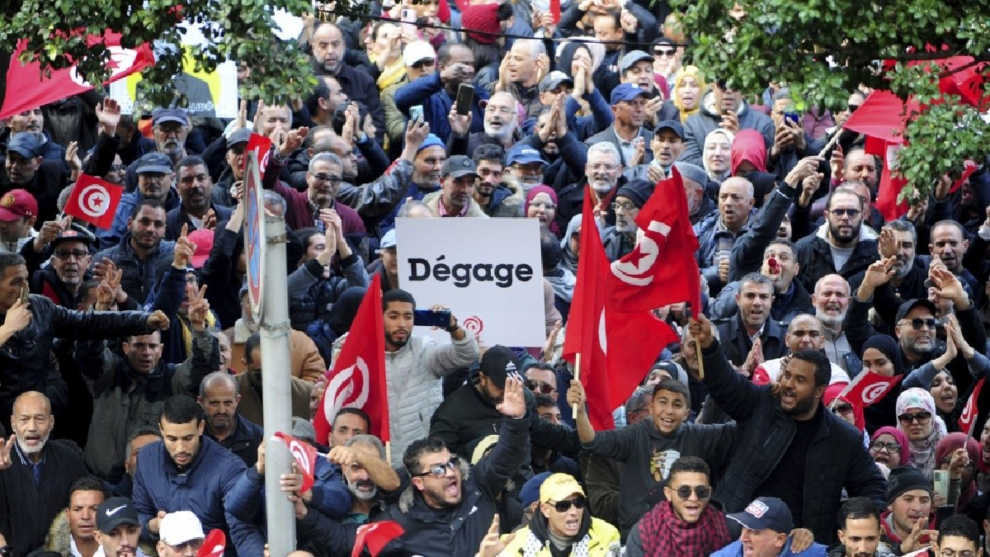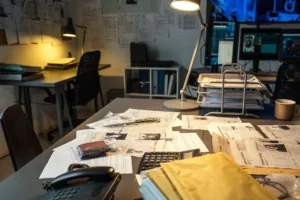Tunisia’s intensifying crackdown on opposition leaders and critics imperils society and risks the return of autocracy, years after demonstrations in the North African country were credited with setting off a revolutionary chain reaction across the region, a group of experts, activists and relatives of those detained have warned.
On Monday, Rached Ghannouchi, the Ennahdha president who was arrested in April, was sentenced in absentia after being found guilty of incitement.
His party, a self-styled “Muslim democrat” movement, had emerged in 2011 as the largest group in the first parliamentary elections following the removal of protest-hit Zine El Abidine Ben Ali, winning 37 percent of the vote.
But since seizing power in 2021, President Kais Saied, who ran as an independent social conservative, has pressured Ennahdha politicians and his critics.
Since February, more than 20 dissidents, activists, journalists and opposition figures have reportedly been arrested.
Those detained have been accused of various charges, some relating to security, but campaigners and experts have said the charges are often trumped up and that Saied is simply pursuing his critics with abandon.
Anas Altikriti, head of the Cordoba Foundation think tank which focuses on relations between the Muslim world and Western nations, said at Thursday’s forum in London that while the so-called Arab Spring was one of the “most transformative moments of this century”, events now in Tunisia are “killing off” its last remnants.
Ghannoushi’s daughter, Soumaya, attended the discussion and said Saied has “devoured” Tunisia’s democracy bit by bit.
“Tunisia today is a cocktail of festering crises, political, social, financial, economic, its deadly cocktail which risks exploding at any moment,” she said.
“[Saied] feeds the nation a rhetoric of hatred [and] invests in crisis in order to distract the nation,” she added. “That’s the difference between having a normal dictator and a populist dictator.”
“The only hope for Tunisians today is to cross over to the other side of the Mediterranean, throw themselves in death boats and seek escape at any [cost].”

Ennahdha has condemned the “unjust decision” against Ghannoushi and other politicians, such as lawmaker Said Ferjani, who was arrested in February, saying the moves are made to mask economic and financial crises leading Tunisia towards bankruptcy.
Seifeddine Ferjani, son of the jailed politician, said, “There are deeply worrying signs of the way Tunisia operates now, such as using anti-terror squads to arrest liberal dissidents, socialist dissidents.
“I think that Tunisia is a ticking time bomb [and] the danger is underrepresented.”
Conservative legislator Crispin Blunt hosted the discussions, which also featured Rodney Dixon KC, a British lawyer leading a case aimed at sanctioning Saied.
Several leading political figures accused Saied of a coup, for moving to rule by decree before rewriting the constitution.
In a video message published on his Facebook page last month, Ghannouchi said, “We are facing another episode of political targeting by judicial means.”
“We do not have a problem with the judiciary, but we do have a problem with dictatorship. The battle in the country is between democracy and dictatorship, which wants to confiscate the gains of our blessed revolution.”
Soumaya told Al Jazeera that her father, who was arrested on the 27th night of Ramadan, one of the holiest dates of the Muslim calendar, was in “good health” and that her mother has been able to visit him.
“It’s not his first time in jail. He’s been in jail under three dictators so far,” she said.
Source: Al Jazeera

















Add Comment